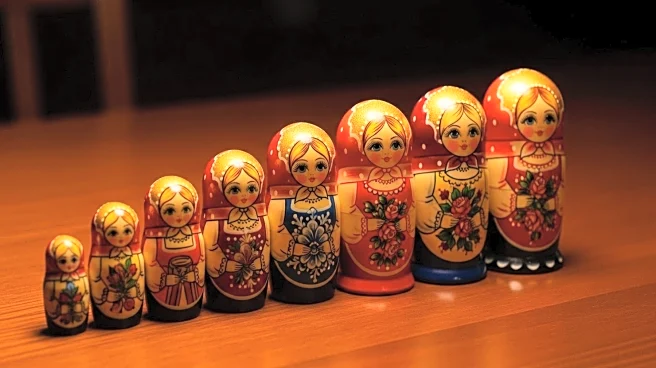What's Happening?
Journalist Julia Ioffe's book 'Motherland' delves into Russian history through the experiences of women, both historical figures and those from her own family. The book suggests that the treatment of women reflects the mindset and culture of Russia. Ioffe, who emigrated from the Soviet Union to the U.S. in 1990, uses her family's history to explore the roles of women in Soviet society. Her great-grandmothers were professionals in fields like medicine and chemistry, illustrating the significant contributions of women in Soviet history. The book also covers figures like Alexandra Kollontai and Nadezhda Krupskaya, highlighting their roles in the Soviet Union's development. Ioffe's narrative combines personal memoir with historical analysis, providing insights into the evolution of Russian society.
Why It's Important?
The book 'Motherland' offers a unique perspective on Russian history by focusing on women's roles, which are often overlooked in traditional narratives. By highlighting the contributions and struggles of women, Ioffe provides a deeper understanding of the cultural and political dynamics in Russia. This approach challenges the conventional male-centric historical accounts and emphasizes the importance of gender in shaping societal developments. The book's insights are particularly relevant in the context of current geopolitical tensions, offering a nuanced view of Russia's past and present. It also serves as a reminder of the resilience and impact of women in shaping history, which can inspire discussions on gender equality and women's rights globally.
What's Next?
The release of 'Motherland' may spark further interest in gender-focused historical narratives, encouraging more authors to explore similar themes. It could also lead to increased discussions on the role of women in shaping political and cultural landscapes, both in Russia and internationally. As readers engage with Ioffe's work, there may be a push for more inclusive historical accounts that recognize the contributions of women. Additionally, the book could influence educational curricula, prompting schools and universities to incorporate gender perspectives into their history courses. This shift could foster a more comprehensive understanding of global history and its diverse actors.
Beyond the Headlines
Ioffe's exploration of women's roles in Russian history raises important ethical questions about historical representation and the marginalization of certain groups. By bringing these stories to light, the book challenges readers to reconsider the narratives they have been taught and the biases inherent in historical documentation. It also highlights the cultural dimensions of gender roles, offering insights into how societal norms and expectations have evolved over time. This broader understanding can contribute to ongoing debates about gender equality and the importance of diverse voices in shaping historical narratives.











